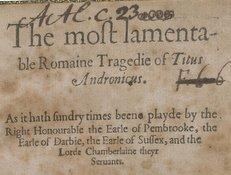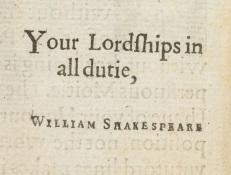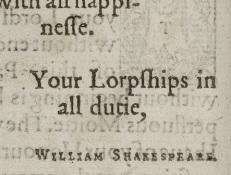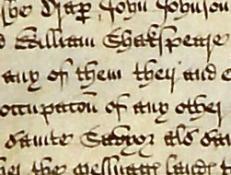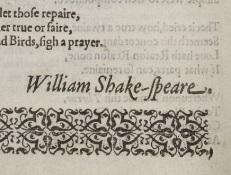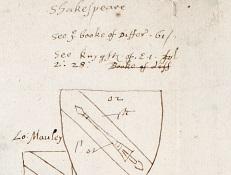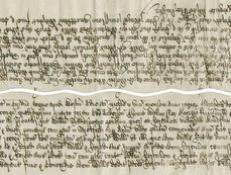To view a sortable list, please visit the Resource
All Documents
1600
This is the second edition of Titus Andronicus, printed in 1600 by James Roberts for Edward White. John Danter registered the play and printed the first edition in 1594, for White and Thomas Millington.
1600
The fourth edition of Lucrece, dated 1600, was printed for John Harrison by his son, John Harrison III. It was set from the third edition, which was also has a 1600 imprint.
1600
The third edition of Lucrece was printed for John Harrison by his son, John Harrison III, in 1600.
October 10, 1601
Dated October 10, 1601, this is the second of five enrolled indentures of bargain and sale for the Globe site, naming William Shakespeare as a leasee. The Globe playhouse was first built in 1599 on land leased from Sir Nicholas Brend.
1601
Shakespeare’s poem, now known as “The Phoenix and the Turtle,” was appended to a collection of poetry called Loves Martyr printed in 1601.This volume mostly consists of Robert Chester’s long and obscure narrative poem about the love between the phoenix and a dove
1598- 1601
SHAKESPEARE DOCUMENTED IS STILL GROWING! Descriptive content and transcriptions will continue to be added, updated and expanded. Check back for regular updates!
1601
SHAKESPEARE DOCUMENTED IS STILL GROWING! Descriptive content and transcriptions will continue to be added, updated and expanded. Check back for regular updates!
ca. 1602
In 1602, York herald Ralph Brooke challenged 23 coats of arms granted by William Dethick, including the arms originally granted to Shakespeare’s father, John Shakespeare, and now belonging to William Shakespeare.
1602
In 1602, two years after the first edition, the second edition of Henry V, known as Quarto 2, was printed by Thomas Creede for Thomas Pavier.
1602
These two documents are the buyer's and vendor's copies of the 1602 final concord for Shakespeare's purchase of New Place. Shakespeare purchased New Place, one of the largest houses in Stratford-upon-Avon, from William Underhill in 1597.

